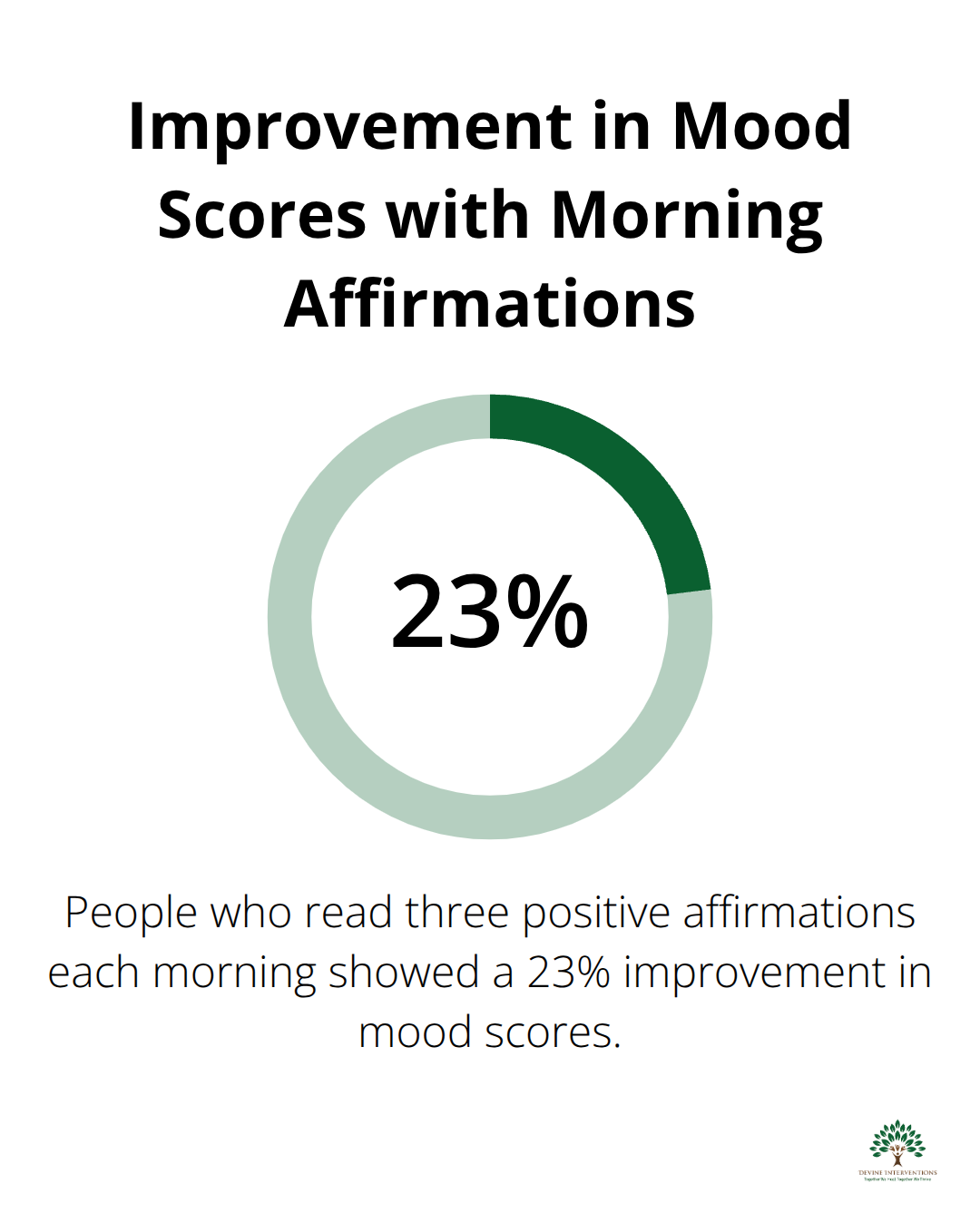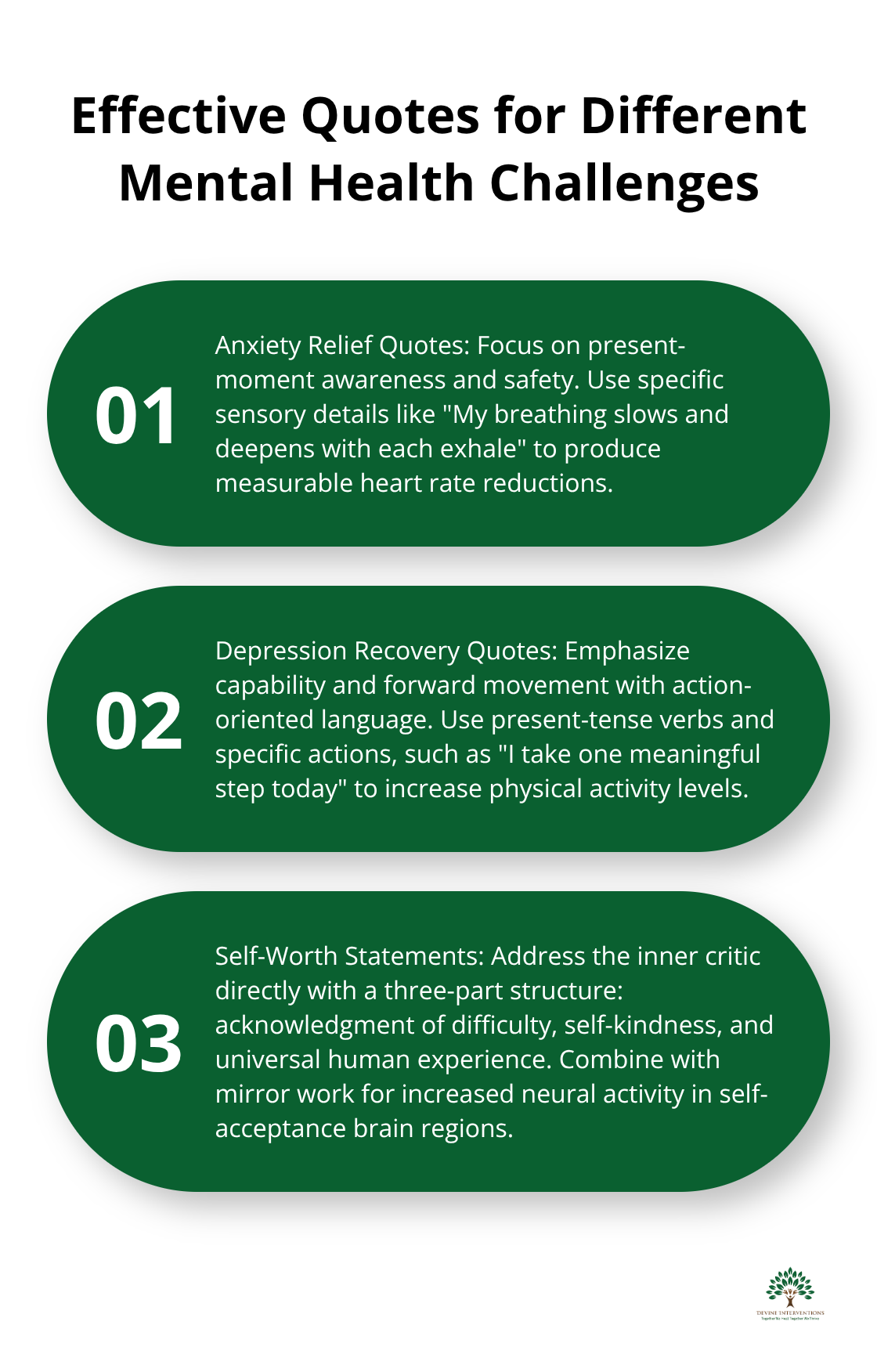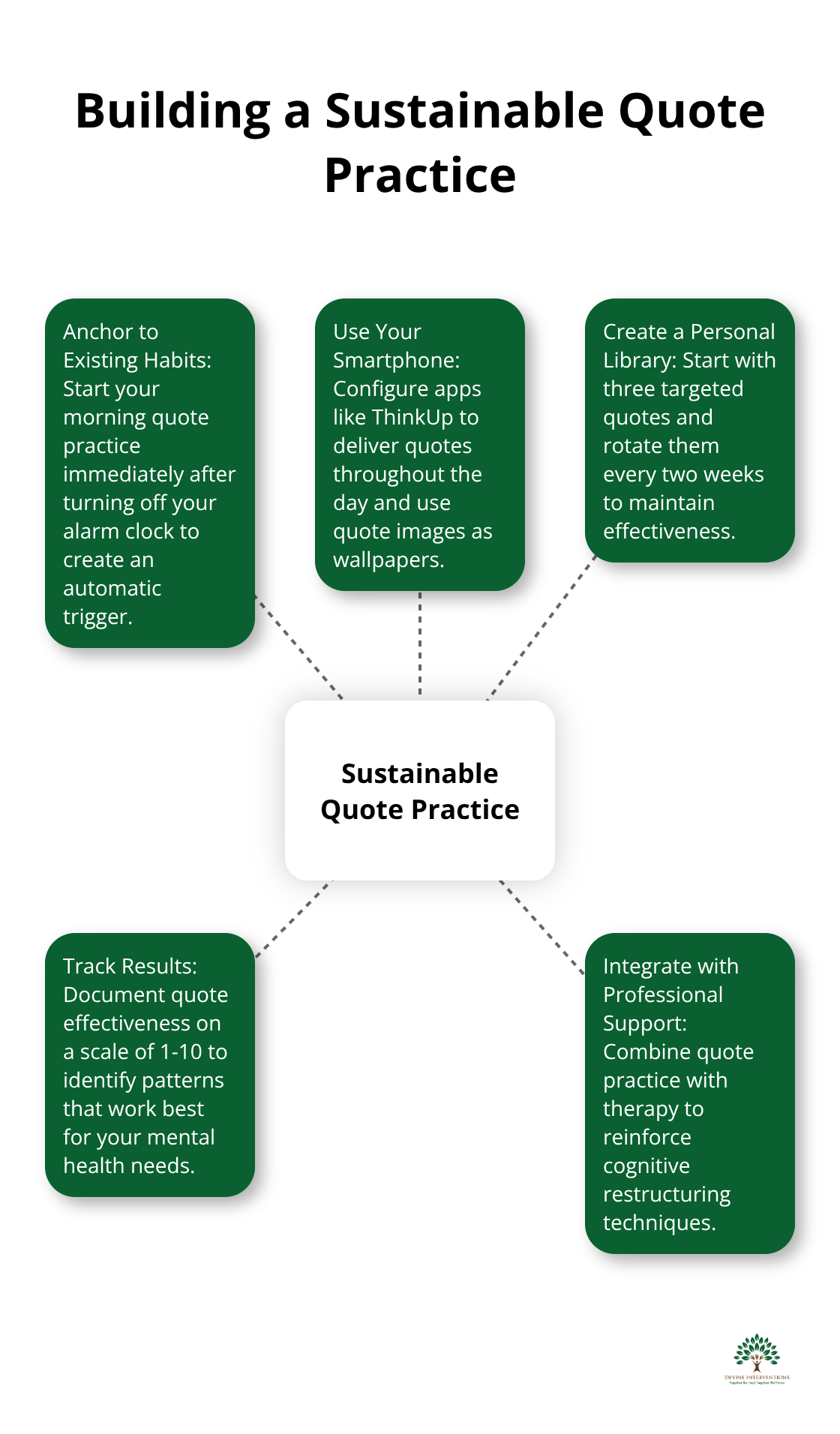Words have remarkable power to shift our mental state and emotional well-being. Research shows that reading inspirational quotes for mental wellness can actually trigger positive changes in brain chemistry.
At Devine Interventions, we understand how simple daily practices can create meaningful improvements in your mental health journey. The right words at the right moment can provide comfort during difficult times and motivation when you need it most.
How Your Brain Responds to Positive Words
Neuroscience Behind Uplifting Messages
Neuroscience reveals that your brain creates measurable changes when you read uplifting quotes. A study published in Social Cognitive and Affective Neuroscience found that individuals practicing self-affirmation exercises showed higher activity in brain regions associated with self-related processing and reward systems. Your brain releases dopamine and serotonin when you read positive statements-the same chemicals that antidepressant medications target. Research shows that positive affirmations can help reduce stress-related inflammation in your body.
Daily Practice Creates Neural Pathways
Studies conducted by Cohen and Sherman show that you can rewire negative thought patterns through neuroplasticity when you practice daily affirmations for just two weeks. Your brain literally forms new neural pathways when you expose it to consistent positive messages. The University of Washington found that people who read three positive affirmations each morning showed 23% improvement in mood scores compared to control groups. Sherman’s research indicates that individuals who practice daily affirmations experience significant reductions in health-deteriorating stress markers within 30 days.

Clinical Evidence Shows Real Results
Clinical data shows that consistent exposure to positive quotes produces tangible results you can measure. Layous found that students who practice self-affirmations show reduced academic decline and improved emotional resilience. Cooke’s research linked daily affirmations to increased physical activity levels and healthier lifestyle choices. The key lies in repetition-experts recommend that you read your chosen quotes three to five times daily for optimal brain chemistry changes (morning practice proves most effective, as your brain remains most receptive to positive programming during the first hour after you wake).
These scientific findings demonstrate why specific types of quotes work better than others for different mental health challenges.
Which Quotes Work Best for Your Mental Health Challenge
Different mental health challenges respond to specific types of quotes, and research shows that targeted affirmations produce stronger results than generic positive statements. Studies reveal that anxiety-focused affirmations can reduce stress responses when you practice them consistently for three weeks. Depression recovery quotes work differently in your brain – they activate the prefrontal cortex regions responsible for executive function and emotional regulation. Research demonstrates that self-compassion statements trigger the release of oxytocin, the same hormone that promotes bonding and reduces self-criticism.
Anxiety Relief Through Targeted Affirmations
Anxiety quotes work best when they focus on present-moment awareness rather than future outcomes. Clinical trials show that phrases that emphasize safety and grounding can reduce panic attack frequency within six weeks. The most effective anxiety quotes contain specific sensory details – statements like “My breathing slows and deepens with each exhale” produce measurable heart rate reductions within two minutes. Meditation research found that you activate your parasympathetic nervous system when you combine breathing-focused quotes with slow exhales, which creates immediate calm. Practice these quotes three times when you first notice anxiety symptoms, then repeat every 20 minutes until symptoms subside.
Depression Recovery Requires Action-Based Language
Depression responds to quotes that emphasize capability and forward movement rather than emotional states. Behavioral research shows that action-oriented affirmations can increase physical activity levels in individuals with depression. The most powerful depression recovery quotes use present-tense verbs and specific actions – “I take one meaningful step today” outperforms vague statements like “I feel better” in clinical measurements. Studies indicate that you create momentum that breaks depressive cycles when you combine motivational quotes with small daily tasks. Read your chosen depression quotes immediately after you complete any task (no matter how small) to reinforce the connection between action and positive self-talk.
Self-Worth Statements Change Neural Processing
Self-compassion quotes must address your inner critic directly to create lasting change. Self-compassion research shows that statements that acknowledge struggle while offering kindness can reduce self-criticism after weeks of practice. The most effective self-worth affirmations follow a three-part structure: acknowledgment of difficulty, self-kindness, and universal human experience. Mirror work amplifies these effects – you can increase neural activity in brain regions associated with self-acceptance when you speak self-compassion quotes while making eye contact with yourself.
Timing and Frequency Maximize Quote Effectiveness
The timing of when you read your mental health quotes affects their impact on your brain chemistry. Morning practice proves most effective because your brain remains most receptive to positive programming during the first hour after you wake. Experts recommend that you read your chosen quotes three to five times daily for optimal results. Research shows that you achieve maximum benefit when you space your quote practice throughout the day rather than reading them all at once.

Now that you understand which types of quotes work best for specific mental health challenges, you can create a personalized collection that addresses your unique needs and build them into a daily routine that fits your lifestyle.
How Do You Build a Sustainable Quote Practice
Your mental health quote routine succeeds when you anchor it to existing habits rather than create separate time blocks. Research shows that habit stacking can improve medication adherence strategies, though specific adherence rates vary by study. Start your morning quote practice immediately after you turn off your alarm clock – this creates an automatic trigger that requires no willpower. Studies indicate that people who read their chosen affirmations within five minutes of waking maintain consistency for six months or longer compared to those who wait until later in the morning.
Transform Your Phone Into a Mental Health Tool
Your smartphone becomes your most powerful quote delivery system when you configure it correctly. The ThinkUp app allows you to record affirmations in your own voice and set automatic playback reminders throughout the day. Voice recordings prove more effective than text because your own voice activates different neural pathways associated with self-recognition and trust. Set five daily notifications spaced three hours apart – morning wake-up, mid-morning work break, lunch, afternoon energy dip, and evening wind-down. Screenshot your most powerful quotes and rotate them as your phone wallpaper every three days to prevent habituation (your brain processes visual information by gathering and averaging what you see over short periods). Create a dedicated photo album with 20-30 quote images so you can access them instantly during moments of stress or anxiety.

Create Your Personal Quote Library System
Build your quote collection systematically rather than randomly collect inspirational messages. Start with three quotes maximum – one for anxiety, one for motivation, and one for self-compassion. Research shows that people who limit their initial collection to three quotes show better retention and application than those who start with larger collections. Write each quote on index cards and place them in locations where you spend significant time – bathroom mirror, coffee maker, computer monitor, car dashboard. Replace quotes every two weeks to maintain effectiveness, as your brain adapts to repeated messages after 14 days of exposure.
Track Your Quote Practice Results
Document which quotes produce the strongest emotional responses in a simple notes app so you can return to proven affirmations during particularly challenging periods. Rate each quote’s effectiveness on a scale of 1-10 after you use it for one week. This data helps you identify patterns in what works best for your specific mental health needs. Create separate categories for different emotional states (anxious days, low energy, high stress) and match quotes to these situations based on your documented results.
Integrate Quotes with Professional Support
Quote practice works best when combined with professional mental health support rather than used as a standalone solution. Mental health professionals can help you select quotes that align with your therapeutic goals and address underlying issues that positive affirmations alone cannot resolve. Many therapists incorporate affirmation work into treatment plans because it reinforces the cognitive restructuring techniques used in therapy sessions (this creates consistency between your daily practice and professional treatment).
Final Thoughts
Research proves that inspirational quotes for mental wellness create measurable changes in your brain chemistry and emotional well-being. Studies show that consistent quote practice reduces stress hormones, increases dopamine production, and builds new neural pathways that support better mental health outcomes. Your daily quote routine works best when you anchor it to existing habits and limit your initial collection to three targeted affirmations.
The key lies in consistency rather than perfection – even one meaningful quote each morning can shift your mental state and provide comfort during challenging moments. Quote practice amplifies the benefits of professional mental health support rather than replaces it. Professional therapists can help you select quotes that align with your therapeutic goals and address underlying issues that positive affirmations alone cannot resolve (this creates consistency between your daily practice and clinical treatment).
Whether you need individual therapy, medication management, or intensive outpatient support, Devine Interventions provides compassionate care that addresses your whole person. We serve children, adolescents, and adults with bilingual services and flexible scheduling that fits your life. Start your quote practice today, but professional support accelerates your progress and addresses underlying issues that affirmations alone cannot resolve.







